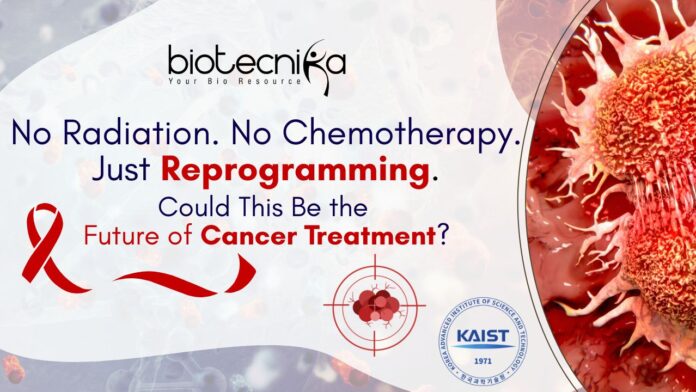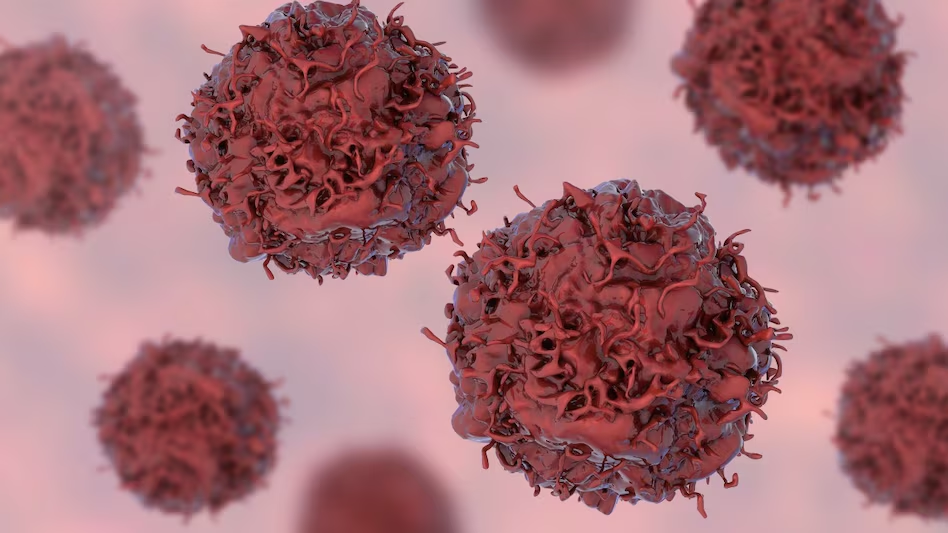Future of Cancer Treatment – No Radiation. No Chemotherapy. Just Reprogramming.
Visualize a world where cancer isn’t poisoned, burned away, or cut out, but is gently guided back to being healthy.
In an incredible discovery that defies the long-held assumptions about cancer, scientists in South Korea have developed a technique that does not destroy cancer cells but transforms them. Forget Chemotherapy’s exhausting toll and radiation’s collateral damage. This new technique in Cancer Therapy aims not to kill but to redeem, reprogramming rogue cells to behave like their healthy counterparts.
In a bold transformation from traditional Cancer therapies, a research team from the KAIST (Korea Advanced Institute of Science and Technology), South Korea, has developed a novel approach to Cancer therapies. This technique is revolutionary as it reprograms Cancer cells into healthy and normal cells without the dependence on Radiation or Chemotherapy.
But how can one turn a cancerous cell into a healthy cell? Could this be the key to ending cancer’s reign? Let’s dive into the Scientific technique behind this approach and explore why Scientists believe it can change the future of Cancer Therapeutics.
The Research Overview on the Future of Cancer Treatment
The Research study, led by Professor Kwang-Hyun Cho, introduces an innovative Computational model that can transform Cancer treatment. Instead of traditionally destroying tumor cells, this innovative method redirects tumor cells back to a differentiated and stable state, thereby effectively rehabilitating them.
This research goes well beyond the traditional ‘destroy the tumor’ mindset. It also explores whether cancer cells can be reprogrammed at the Genetic level to stop their abnormal or malignant behavior as well as return to a healthy cellular state.
Behind the Breakthrough: The Power of BENEIN
At the core of the Research is a Digital Modeling System, “BENEIN” (Boolean Network Inference and Control), a powerful Computational System tool designed to simulate key Genetic Regulatory networks inside individual living cells. Using large-scale single-cell RNA sequencing data, BENEIN reconstructed the complex signaling pathways determining a cell’s behavior.
Using Gene Expression Data from 4,252 human intestinal cells, Cho’s team mapped a Gene network with 522 Genetic components. This simulation aided them in identifying the key Genetic Regulators that determine whether the cells exhibit malignant behavior or behave like normal cells.
Through rigorous Computational Analyses, three particular Genes emerged as central Regulators of the cancer cell’s identity, i.e.,:
- FOXA2
- HDAC2
- MYB
“BENEIN” predicted that “simultaneous knockdown of these three genes would disrupt Cancer cell proliferation as well as trigger differentiation, essentially bringing cancer cells’ identity to normalcy.
To validate their computational predictions, the KAIST team tested this gene knockdown strategy in colorectal cancer cell lines—specifically, HCT‑116, HT‑29, and CACO‑2.
Beyond cancer, the BENEIN framework proved effective in other systems. (Representative image)
The Results & It’s Implications on the Future of Cancer Treatment
- In HCT-116, HT-29, and CACO-2 human cell lines, the Triple gene knockdown suppressed cancer cell proliferation and slowed cell growth more efficiently than targeting any single Gene.
- The treated cells started expressing Biomarkers commonly found in healthy intestinal tissue, like VDR and KRT20.
- Cancer-associated pathways such as WNT and MYC were significantly suppressed.
Interestingly, the Gene Expression Profiles of the reprogrammed cells closely matched those of healthy tissues in the ‘Cancer Genome Atlas,’ offering Molecular confirmation of the transformation.
The cells under examination exhibited signs of differentiation, rather than stopping growth. Their Genetic signatures and behavior were nearly indistinguishable from those of healthy and normal epithelial cells.
The In Vivo Results
The Researchers extended their investigation to animal models to assess whether this futuristic approach could suppress the growth of tumors in living systems. They implanted both untreated as well as triple-gene-knockdown colorectal Cancer cells into mice and further monitored tumor development in them.
The results were:
- Mice injected with treated cells eventually developed significantly smaller tumors, both in weight as well as size.
- Histological Analyses showcased tissue structure resembling standard intestinal architecture, unlike the aggressive morphology typical of untreated tumor cells.
These results reinforced the Scientific Theory that the Gene Knockdown approach induces functional reprogramming as well as inhibits proliferation into normal tissues.
BENEIN’s Broader Impact Beyond Cancer
BENEIN is exceptional compared to other experimental tools in its predictive accuracy and flexibility across diverse Biological Systems.
Beyond cancer cells, the Researchers applied the BENEIN framework to model:
- Mouse hippocampus development is essential for Neuroscience Research
- T-cell (tumor-cell) activation pathways are critical for the Immune response
BENEIN successfully identified the critical regulators of cellular behavior, thereby outperforming established tools such as VIPER and SCENIC in both speed and precision.
This suggests that BENEIN isn’t limited to Oncology; it can detect hidden Regulatory levers in any complex Biological process.
The Road Ahead for the Future of Cancer Treatment
Despite the promise of these findings, the researchers are careful about immediate Clinical translation. Several challenges remain, such as:
- Safe Gene Delivery: Achieving controlled Gene Knockdown in human patients would require a precise and safe delivery mechanism, like nanoparticle carriers or viral vectors.
- Tissue Specificity: This technique has been validated only in Colorectal Cancer. Its efficacy in other tumor types, such as Lung, Pancreatic, or Breast cancer, is still unknown.
- Immune Compatibility: How reprogrammed cells interact with the patient’s healthy Immune system could influence their efficacy and safety.
- Stability Over Time: It remains to be seen whether reprogrammed cells maintain their normal phenotype in the long term or risk reverting to malignancy.
From Malignant to Normal Cells
|
Category |
Observation After Triple Knockdown |
|
Key Genes Targeted |
MYB, FOXA2, HDAC2 |
|
Normal Markers Activated |
VDR, KRT20 |
|
Cancer Pathways Suppressed |
WNT, MYC |
|
In Vivo Results |
Smaller and less aggressive tumors in mouse models |
| In Vitro Results |
Slowed proliferation and Gene profile matched normal tissue |
A New Era of Cancer Reprogramming?
If future and advanced Research expands and confirms upon these findings, the implications for Oncology could be transformative:
- Targeted treatment: Cancer Therapies could be customized to individual tumor profiles using BENEIN’s Computational modeling.
- Tissue preservation: Organs affected by tumors might remain functional and intact.
- A shift in mindset: Cancer treatment’s transition from eradication to re-education at the cellular level.
- Minimized side effects: Patients could avoid the toxicity of Radiation or Chemotherapy.
While the journey from bench to bedside is long, this study opens a new avenue in cancer research. Precision Computational Modeling intersects with gene regulation to transform how we perceive and treat malignancy.
Conclusion
The KAIST study introduces an innovative and bold concept: reprogramming cancer cells rather than destroying them. Supported by computational, laboratory evidence, and early animal validation, this research could pave the way for a next-generation cancer therapy focused on stability, safety, and transformation rather than collateral damage.
The journey from concept to Clinic may still be long, but this Research illuminates the way with rare clarity. KAIST’s work is more than a technical innovation; it’s a Philosophical shift. For the first time, we’re not just learning to attack Cancer cells more efficiently.
As the KAIST team forges ahead with testing, expanding, and refining their Scientific method, one thing is sure: a new chapter in Medicine has begun. And it doesn’t start with war; it starts with healing.
To delve deeper, refer to the original publication: Gong, J. R., Lee, C. K., Kim, H. M., Kim, J., Jeon, J., Park, S., & Cho, K. H. (2025). Control of Cellular Differentiation Trajectories for Cancer Reversion. Advanced Science, 12(3), 2402132.
























